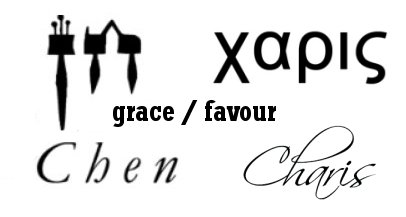
Love is an inner quality expressed outwardly as a commitment to seek the well-being of others through concrete acts of service. Love is a central biblical concept for defining the relationship between Elohim (God) and human beings.
Several words are used in the Tanakh (Old Testament) to describe various aspects of love. Most common is the Hebrew 'ahav and its derivatives, which characterise relationships ranging from the secular to the sacred.
 Ahavah-Love
Ahavah-Love
A. Secular Human Relations
Love describes the rull range of relations between the sexes (e.g. Gen.29:18,20; Judg.16:4; 1 Sam.18:20). Physical attraction and sexual love are powerful inner forces (SS 8:6-7; Prov.5:19-20)
Love is also the bond between parent and child (Gen.22:2; 44:20). Parental love always seeks the best of the child, which may include physical discipline (Prov.13:24; cp. 3:12).
Love is the bond of mutual devotion and commitment expressed in a close friendship such as that between Jonathan and David (1 Sam.18:1-4; 20:17; 2 Sam.1:26) and the devotion of Ruth, who sought the welfare of Naomi beyond all cultural expectations or legal requirements (Ruth 4:15).
B. Divine-Human Relations
1. The Torah (Pentateuch). The Book of Deuteronomy summarises the saving history of Elohim's (God's) relation with Israel as the expression of Yahweh's freely bestowed love. Yahweh chose Israel and through them out of Egypt because He entered into covenant with and loved their ancestors (Dt.4:31-37). The entire narrative of the calling, election, covenant, and promises made to the family of Abraham, Isaac, and Jacob (Gen.12-50) is hereby declared to be the story of Elohim's (God's) unmerited love, bestrowed on Israel as a self-motivated act of grace.
Only by embracing the unity of the divine revelation in the history of salvation as an act of Yahweh's love could the Israelites be called upon to respond whith a whole-hearted love for Elohim (God) (Dt.6:4-6). But because the human condition of the heart is easily drawn away from a commitment to Yahweh (Dt.8:1-20) and stubbornly resists Elohim's (God's) will (Dt.10:16), Yahweh in a surprising act of grace (undeserved loving-kindness and unmerited favour) promises to enable Israel to love and obey Him by metaphorically 'circumcising the heart' of Israel (Dt.30:6). Israel's love, like Yahweh's, is demonstrated by acts of love expressed as obedience to Yahweh's Torah (Law) in the daily tasks of living (Dt.6:7-9). The Torah (Law) is Israel's way to imitate the love of Yahweh as experienced when Israel was redeemed from Egypt (e.g. Dt.24:17-18). (See Covenant Love: The Heart Life in Yahweh).
Although Yahweh was selective in choosing Abraham and His descendants out of all the peoples of the world (Dt.19:14-15), Elohim's (God's) protection and providential care extends to the outsiders of society, even foreigners (Dt.19:18; cp. Ex.23:9). Yahweh's primary and ultimate aim in forming a people was to be a source of blessing to everyone (Gen.12:2-3), through whom all nations will be taught about Yahweh's will for everlasting shalom (peace) (Is.2:2-4). Israel was commanded to show concrete acts of love to their enemies and not to retaliate against those who wronged them (Prov.24:29).
2. The Nevi'im (Prophets). The nevi'im (prophets), especially Hosea and Jeremiah, depict Yahweh's love for Israel in terms of family imagery. Israel is Yahweh's adopted son, on whom Yahweh bestowed His fatherly care by redeeming him from Egypt and providing for him along the way (Hos.11:1-4). Using another family image, Israel is also the wife whom He loves (Hos.3:1).
Elohim (God) demands that the Israelites have an intimate relationship with Him characterised by chesed, that is to say, "steadfast love" or "loyalty" which includes having a "knowledge of Elohim (God)" (Hos.4:1-2). But to Yahweh's disappointment Israel's love is as fleeting as the morning dew (Hos.6:4-6), misdirected as sexual promiscuity with Canaanite gods in the fertility cult (Hos.3:1; 4:10-14; cp. Jer.2:20-25; 3:6-10).
Where restoration of the relationship looks impossible, Yahweh's covenant love transcends human love. Elohim (God) is the Qadosh (Holy, Set-Apart) One whose compassion will restore His lost son (Hos.11:8-9; cp. Jer.31:15-20), healing him and enabling him to return to Yahweh (Hos.14:1-8/MT 2-9; cp. Jer.3:21-4:1). Likewise, Yahweh will woo back His lost bride and establish an everlasting marriage (Hos.2:16-23/MT 18-25). Similarly, Yahweh will bring His discouraged people out of exile because of His great love for them (Is.43:4-5). His momentary wrath, or judgment, will fade before this compassion and everlasting love. (See also Grace below).
 Loving-Kindness, Grace, Mercy and Seadfast-Love
Loving-Kindness, Grace, Mercy and Seadfast-Love
When describing Elohim (God), the Hebrew chesed means 'grace', 'mercy, 'steadfast-love' and 'undeserved loving-kindness'. The traditional translation "loving kindness" entered English usage through the 1535 Coverdale Bible and King James Version of 1611 but the primary definition of the Hebrew chesed is 'demonstrated loyalty', i.e. that loyalty that exhibits itself in actions rather than words or sentiments (e.g. Gen.40:14; Ex.20:6). Furthermore, the term has a magnaminous (generous and forgiving) quality. Loving-kindness is a type of loyalty that does not merely meet an obligation but goes the second mile, just as the Israelites obeyed Moses when they followed Yahweh into a "land not sown" (Jer.2:2). This linguistic compound representing one virtue piled atop another expresses a special and remarkable benificence (active goodness or kindness).
A final nuance of loving-kindness is its assymetrical nature. Behaviour worthy of the term must be generous: a virtue unilaterally bestowed, without expectation of reciprocity, and is usually associated with the party that holds the social advantage. For instance, Rahab the prostitute reminds the Israelite spies that she had treated them 'kindly' by hiding them and denying their presence to the king of Jericho (Josh.2:12). This aspect of loving-kindness helps explain its popularity in descriptions of Elohim (God) (e.g. Ps.107:1): Yahweh's demonstrated loyalty to creation has an uncoerced, gracious quality.
Of the many things said of Elohim (God) in the Tanakh (Old Testament), His chesed or loving-kindness is one of the most prevalent based on its occurence in so many formulas (e.g. Ex.34:6; Num.14:18; 1 Ki.8:23). It best describes the quality of Elohim (God) that attracts the obedience, praise, and love of individuals.
3. The Synoptic Gospels. In the Messianic Scriptures (New Testament) Elohim's (God's) love (Gk. agapé) is enacted through Messiah, and made effective through the gift of the Ruach haQodesh (Holy Spirit).
 Agapé-Love
Agapé-Love
Elohim's (God's) love is evident through the work of Yah'shua (Jesus), who does acts of mercy such as healing the sick and accepting the unacceptable by eating with tax collectors and sinners, and forgiving their sins. In the parables Yah'shua (Jesus) presents Elohim (God) as one who bestows His love, mercy, and forgiveness as acts of undeserved grace (e.g. Mt.18:23-35; Lk.15:11-32). Those who receive Elohim's (God's) compassionate forgiveness are also expected to treat others with the same love.
The Great Mitzvah (Commandment) is the summary of the Tanakh (Old Testament) Torah (Law), a double mitzvah (commandment) to love Elohim (God) and neighbour (Mt.22:34-40; cp. Dt.6:4; Lev.19:18). In the Parable of the Good Samaritan Yah'shua (Jesus) defines the neighbour as one who shows compassion beyond religious and ethnic boundaries (Lk.10:29-37). Love is doing good even to those who do not love you, even to your enemy (Lk.6:27-36).
4. The Johannine Writings. In the works associated with John, Elohim's (God's) love is clearly articulated. Yahweh's love for the world is demonstrated by sending His Son, Yah'shua (Jesus), to die for the sins of the world that those who believe in Him might have chayim (life) (Jn.1:29; 3:16; cp. 20:31). Those who belong to the Son love Him, and show their love by keeping the mitzvot (commandments) (Jn.14:15), summarised at the mitzvah (commandment) to love one another (Jn.15:12).
Because of Elohim's (God's) great act of love, believers ought to love one another (1 Jn.4:10-11). Those born of Elohim (God) are enabled to love Him and keep His mitzvot (commandments) by emunah (faith) (1 Jn.5:1-5), because love is an essential defining characteristic of Elohim (God). The love that the believer shows is "perfect love", Elohim's (God's) love which has reached its perfection, or goal, in loving others (1 Jn.4:17-18). Believers show Elohim's (God's) love by concrete acts of service which meet real human need, just as Yah'shua (Jesus) showed Elohim's (God's) love by laying down His life for them (1 Jn.3:16-17).
5. The Pauline Letters. For Paul, love starts with the "Elohim (God) of love and shalom (peace)" (2 Cor.13:11) whose gracious act of reconciling love is revealed in Messiah. Nothing in creation can separate the reconciled one from this love (Rom.8:35-39).
According to Paul "the whole Torah (Law) is summed up in a single mitzvah (commandment), 'You shall love your neighbour as yourself'" (Gal.5:14, NRSV). Paul's famous description of Christian/Messianic love in 1 Corinthians 13 also could be regarded as a portrayal of Messiah.

The power to love comes from Elohim (God) alone. The Ruach haQodesh (Holy Spirit) pours Elohim's (God's) love into the believer's heart, producing love as the foremost fruit of the Ruach (Spirit) (Rom.5:5; Gal.5:22), which sets believers free from the power of sin by manifesting the love of Messiah in their lives (Rom.8:1-9).

A central term in the discussion of relationships between people and the divine are the Hebrew chen and chesed (for chesed, see above) both of which indicate Yahweh's disposition to show unmerited favour toward humans as well as His continuing loyalty toward those accepted into divine favour. This favour manifested itself in acts of deliverance in time of need and provision of daily sustenance. Favour is shown in the face of the benefactor, so that "seeking Elohim's (God's) face" (Ps.27:8-9) and imploring Yahweh to "make Elohim's (God's) face to shine" and to "lift up Elohim's (God's) countenance" (Num.6:25), are all expressions of seeking Elohim's (God's) favour, His disposition to help and to provide for the well-being (shalom) of Yahweh's people. Favour once shown can also be withdrawn: this is commonly expressed as anger, the opposite of favour (cp. Heb.10:26-31), represented by the hiding of the face or removal of the offender from the presence of the benefactor (Ps.13:1/MT 2; 51:11/MT 13).
The casting of the divine-human relationship in these terms reflects the manner in which human beings interacted. People in an inferior position (with regard to power or resources) would "seek the favour" of a person in a socially superior position. Joseph "finds favour" in the sight of Potiphar, the jailer, and Pharaoh's household (Gen.39:4,21; 50:4). This human dimension remains important in the narrative of Ruth and 1 Samuel, as well as in Proverbs. At such a level, "favour" does not necessarily create an ongoing relationship. It may be a single act of beneficence with a simple response of gratitude. Frequently, however, it does initiate an ongoing relationship in which the beneficiary returns loyal service for the favour shown by the benefactor, and the benefactor continues to provide assistance and access to resources (cp. the story of Joseph).
The relationship of 'grace' between Yahweh and the people of Israel is ongoing. Elohim's (God's) acts of 'favour' in the wilderness establish a relationship which now has clearly articulated mutual covenant obligations. An initial stance of uncoerced favour leads to the formation of a relationship in which the benefactor will continue to provide assistance, and the beneficiaries will remain singularly loyal to the Patron and offer services to the Patron. Direct parallels may also be drawn in the relationship between husbands ('patrons') and wives ('clients') in human marriage (Eph.5:24). This loyal service was also to be fulfilled through beneficence toward one's fellow Israelites. Generosity and justice in human relationships were obligations imposed on the people as their fitting response to Elohim's (God's) generosity toward them. Yahweh's chesed or 'loyalty' remains 'favour' in that where the human beneficiaries continually fail in their loyalty and service, Yahweh-Elohim continues to call them back into favour, punishing for a time but always restoring those who have broken emunah (faith). Even the declaration of a b'rit chadashah or 'new covenant' through Messiah which replaces the 'old' or former covenant broken by the ancestors is a declaration of Elohim's (God's) commitment to set aside all these offences and insults to Yahweh's favour, and approach the people anew in favour (Jer.31:31-34).
In the Messianic or New Testament period, "grace" (Gk. charis) is similarly embedded in the Greco-Roman institution of patronage. Seneca claimed that patronage constituted the "chief bond of human society" (Seneca, De Beneficiis 1.4.2), and so the New Testament proclamation of Yahweh's favour would have been heard and interpreted within this social context. Patrons gave access to goods, entertainment, and advancement. The client, who received the benefit, accepted the obligation to spread the fame of the giver and declare gratitude for the patron's gifts (cp. Seneca, 2.21.1; 2.24.2). The client also accepted the obligation of loyalty and service to the patron. A third figure in this network has been called the "broker" (cp. mesités). This figure was a patron to his or her clients and a client or friend of another potential patron. The broker's chief benefaction was access to another patron and the resources at his or her disposal.
With this social-semantic field, charis has three distinct meanings. It is first the disposition of a benefactor to aid a supplicant, "not in return for something nor in the interest of him who renders it, but in that of the recipient" (Aristotle, Rhetoric 2.7.2). In this sense it is most akin to the Hebrew chen. It also refers to the client's proper return for a benefit, namely, gratitude and loyal service (cp. 2 Cor.4:15; Heb.12:28; 13:15-16), as well as to the actual gift or benefit conferred (cp. 2 Cor.8:6-7). Paul is known as a proponent of 'salvation by grace'. He is concerned (e.g. in Galatians) to establish Elohim's (God's) uncoerced initiative in reaching out to form a people from all nations through His anointed agent, Yah'shua (Jesus).
Requiring Torah-observance as a condition for salvation threatens to set aside or nullify the favour of Yahweh which Yah'shua (Jesus), the 'Broker', has gained for His faithful 'clients' (Gal.2:21; 5:2-4), because it casts doubt on Yah'shua's (Jesus') ability to secure Yahweh's favour. It shows distrust toward Yah'shua (Jesus), the immediate Patron of the new Messianic Israelite people of Elohim (God) formed from Judeans and Gentiles, called into Elohim's (God's) favour (Gal.1:6). Yahweh's favour, however, seeks a response of faithfulness (pístis) in Torah-observance and service from Elohim's (God's) clients. Paul speaks, therefore, of the "obedience of emunah (faith)" (Rom.1:5; 16:26) which is the goal of his mission, calling forth the proper Torah-obedient response of those who have benefited from Yahweh's gift. This involves the offering up of the believers' whole selves to Elohim's (God's) service, to do what is righteous in Yahweh's sight (Roman.12:1; 6:1-14). As in the Tanakh (Old Testament), this response centres not only on honouring Elohim (God), but on ahavah (love), generosity, and loyal service toward one's fellow believers (Gal.5:13.14; 6:2; Rom.13:9-10). The giving is free and uncoerced, but the ancient hearer knew that to accept a gift meant accepting also obligation to the giver which would include living the Torah-lifestyle ordained by Yahweh from the beginning.
The author of Hebrews gives us exceptional insight into the workings of "grace" within the patron-client relationship between Elohim (God) and human beings. Whereas humanity stood apart from Yahweh's favour on account of the sins which stained the conscience, Yah'shua's (Jesus') priestly sacrifice (brokerage) brought forgiveness and cleansing, so that Yah'shua's (Jesus') clients might have "access to the thone of favour", i.e. come into Elohim's (God's) presence, and seek Elohim's (God's) face (favour), and receive "favour to help in time of need" (e.g. the resources to hold on in the face of opposition - Heb.4:16). In order to attain the promised benefits of a place in Elohim's (God's) city (Heb.11:11-13; 13:14), the clients have need of "emunah/pístis (faith)" and "endurance" (Heb.10:35-39). They must remain loyal to their Patron in the face of society's hostility and not waver in their trust. To give up Yahweh's gifts (and show slight regard for His "spirit of favour" - Heb.10:29) for the sake of peace with society would be an outrageous insult to the Patron, a spurning of Elohim's (God's) gifts and of Yah'shua's (Jesus') costly mediation, resulting in Yahweh's "wrath" (Heb.10:26-31; 3:7-4:11). The author here gives insight into the reciprocal nature of cháris: Elohim (God) has accepted the believers into favour through Yah'shua's (Jesus') effective mediation; the believers, as honourable clients, are now to return "grace" for "grace", to "show gratitude" (Heb.12:28) to Yahweh by continuing to bear witness to their Benefactor in a hostile world (Heb.13:15) and by assisting one another by ahavah (love) and service, encouraging and supporting one another in the face of an unsupportative society (Heb.13:1-3,16; 6:10).
Summary
In summary, the Besorah (Gospel) of Yah'shua (Jesus) is the Besorah (Gospel) of Love - Ahavah (Heb.), Chesed (Heb.), Chen (Heb.), Agapé (Gk.) and Cháris (Gk.). Yahweh-Elohim, our Heavenly Father, is Himself defined as Ahavah (Love) (1 Jn.4:8,16). Elohim's (God's) love is the unmerited acceptance of all people expressed in concrete acts of providence and salvation. Through emunah (faith) in Messiah the believer is enabled to love with the love of Elohim (God) through the work of the Ruach haQodesh (Holy Spirit).
Acknowledgements
[1] F.W.Danker, Redemptive Epigraphic Study of Graeco-Roman and New Testament Semantics (St.Louis: 1982)
[2] D.A. DeSilva, Exchanging Favor for Wrath: Apostacy in Hebrews and Patron-Client Relationships (JBL 115, pp.91-116: 1996)
[3] D.N.Freedman, Eerdmans Dictionary of the Bible (Grand Rapids: 2000)
[4] V.P.Furnish, The Love Command in the new Testament (Nashville: 1972)
[5] R.M.Hals, Grace and Faith in the Old Testament (Minneapolis: 1980)
[6] K.D.Sakenfeld, The Meaning of Hesed in the Hebrew Bible - HSM 17 (Missoula: 1978)
[7] K.D.Sakenfeld, Loyalty and Love: The Language of Human Interconnections in the hebrew Bible (Winona Lake: 1987)
[8] W.Klassan, Love Your Enemies: The Way to Peace - OBT 15 (Philadelphia: 1984)
[9] A.Nygren, Agapé and Eros (Chicago: 1982)
[10] R.P.Saller, Personal Patronage Under the Early Empire (Cambridge: 1982)
(4 December 2017)
|


